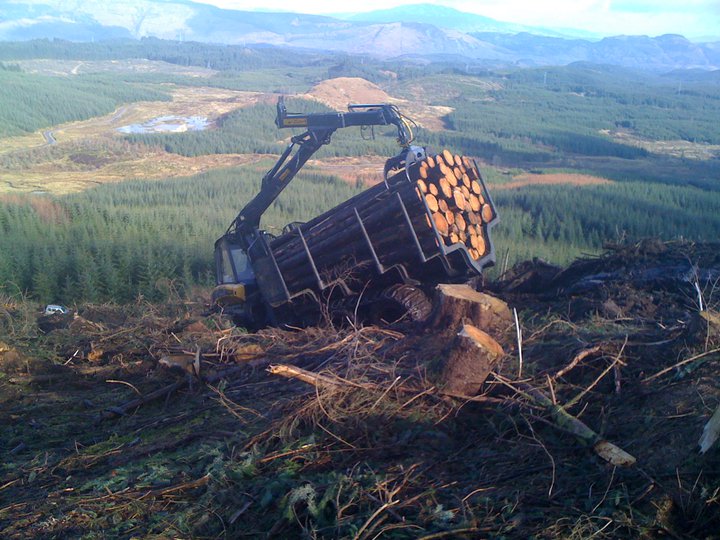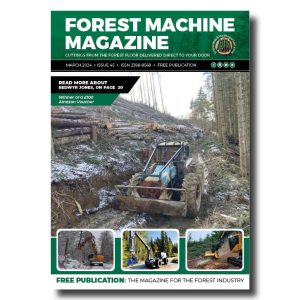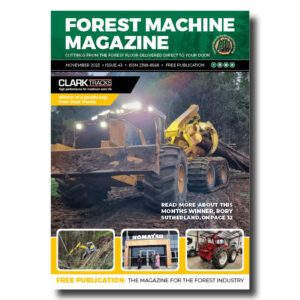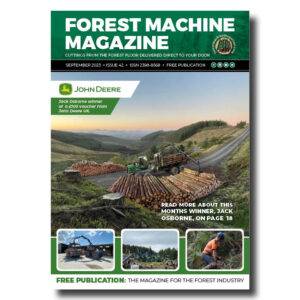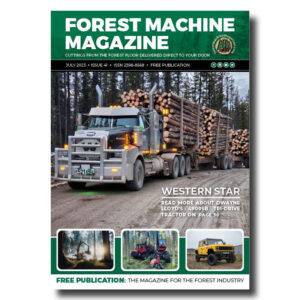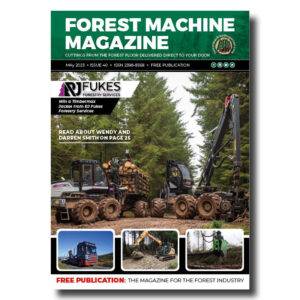A view from the front line of forestry
We are currently facing a significant crisis in the forestry industry. Contractors are at their wits’ end, workers are seeking alternative employment, sawmills are overstocked with some shutting down altogether, timber is left stacked along the roadside, and wood lorries are sitting idle. This is just the tip of the iceberg, and the problems we are encountering seem endless at the moment.

-
That’s a remarkable amount of work hours for a single machine, the Norcar 600 owned by Erkki Rinne is taken well care of, it even has the original Diesel engine.
-
Kieran Anders is a forestry contractor working in the lake district. His work involves hand cutting and extracting timber using a skidder and tractor-trailer forwarder.
-
It is not possible to eliminate chain shot, but there are simple steps that can be taken to reduce the risk.
-
Arwel takes great pride in the fact that the mill has no waste whatsoever, “the peelings are used for children’s playgrounds, gardens and for farm animals in barns in the winter and the sawdust has multiple uses in gardens and farms as well.
-
Timber hauliers need to encourage young blood in, and also look after the hauliers we have, we need make the sector a safe and positive place to work.
FIND US ON
Having spent my life in forestry—first as an employee of the Forestry Commission for eight years and then as a forestry contractor for 36 years before launching Forest Machine Magazine in 2016—I have witnessed many highs and lows over the decades. However, I have never seen our industry in such turmoil as it is today.
In the earlier days of my career, forestry was a close-knit community where most of us knew one another. While there were occasional arguments and disputes, these were often settled in the old-fashioned way. I don’t recall many grudges; instead, a good airing of grievances typically led to mutual respect and the formation of strong friendships.
No one would turn their back on someone in trouble. I’ve travelled long distances in my forwarder to help a colleague whose machine was bogged down or to lend a hand during tough times. I have also found myself on the receiving end of help in difficult moments, and I truly appreciated the support.
There is enough work for everyone, and I believe some people today need to be reminded that we are competitors, not enemies.
What I find most distressing is the apparent shift in attitudes. I’m not sure whether people’s views of each other have changed or whether social media is exacerbating the issue, but it seems more common now to ridicule someone for asking a question than to offer help and advice. We’re reaching a point where people may be afraid to ask questions at all!
In most business cases, your success or failure depends on your own efforts. If you offer the right product at the right price and work hard to build a good, reliable reputation, then word of mouth will lead to more work.
Unfortunately, this isn’t the case in forestry. No matter how hard you work or how skilled you are, you are ultimately at the mercy of foresters, timber merchants, sawmills, and wood-processing companies.
Contractors make significant investments in equipment to fulfil contracts that supposedly guarantee a specified amount of work. However, these agreements can often be worthless during market downturns.
Furthermore, contractors and companies invest significant time and money in staff training. Due to the serious lack of training facilities, they find that once employees become trained and reasonably competent, another contractor can easily offer them much higher pay or access to brand-new machinery. This situation is incredibly unfair, as the new employer has not incurred the training costs, and there is little that can be legally done to prevent it.
The forestry industry appears stuck in the 19th century when it comes to workers treatment.
Organisations like CONFOR aim to support sustainable forestry and wood-using businesses through political engagement, market promotion, and the enhancement of their members’ competitiveness.
The Forestry Contracting Association (FCA) claims to be the only body representing businesses and individuals involved in all aspects of forestry contracting. They provide support, advice, and benefits to help members become more successful and profitable.
The Forest Industry Safety Council (FISA) comprises representatives from leading industry organisations. They have collaborated to create the Forest Industry Safety Accord, which outlines the industry’s commitment to improving workplace health, safety, and welfare.
From my perspective, none of these organisations seems to be providing much help to those in need.
I’ve often heard the saying, “If it’s not broken, don’t try to fix it.” However, from where I stand, forestry is broken, and no one seems willing to offer help to fix it.
Please don’t misunderstand me; this is not the end of forestry as an industry. As usual, we will muddle through, but at what cost?
Some of the best contractors and operators are either retiring or becoming disillusioned and are seeking other types of work. Many of these skilled professionals are being replaced by individuals who lack the same passion and motivation for forestry and view it merely as a way to pay the bills. The quality of their work reflects this attitude.
To me, forestry is not just a job; it is a way of life.
There are contractors and subcontractors who are professional businesspeople dedicated to forestry and the environment. They have made substantial investments in machinery and equipment to fulfil their commitments by delivering the best possible service to their clients. It is high time that their efforts are recognised and rewarded before it’s too late.
Sign up for our free monthly newsletter here
Contact forestmachinemagazine@mail.com to get your products and services seen on the world’s largest professional forestry online news network.
#homeoflogging #writtenbyloggersforloggers #loggingallovertheworld
Written by loggers for loggers and dedicated solely to the equipment used in forestry operations.
